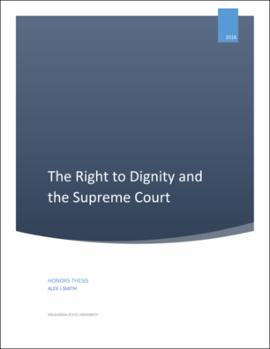| dc.contributor.author | Smith, Alex J. | |
| dc.date.accessioned | 2017-10-10T20:57:14Z | |
| dc.date.available | 2017-10-10T20:57:14Z | |
| dc.date.issued | 2016-12-08 | |
| dc.identifier | oksd_smitha_HT_2016 | |
| dc.identifier.uri | https://hdl.handle.net/11244/52359 | |
| dc.description.abstract | A thorough investigation of the term dignity and how it applies to the Supreme Court. By tracing different understandings of dignity from Aquinas to Kant, we can begin to define dignity. Kant's definition, like many Enlightenment ideas, had a significant impact on the Framers. The Supreme Court has provided models from the past to investigate and discover that there is a need for a "right to dignity" and the right does indeed exist. In today's court, the "right to dignity" is an individual's endowment to not have to follow a law that has meaning other than morality, since that individual has every ability to ponder his own morality. But "the right to dignity" could evolve and if it follows Justice Brennan's views one day it could mean that the "right to dignity" is the protection the individual is guaranteed from laws or government action with no purpose or externality small enough to not be worth infraction of rights. | |
| dc.format | application/pdf | |
| dc.language | en_US | |
| dc.rights | Copyright is held by the author who has granted the Oklahoma State University Library the non-exclusive right to share this material in its institutional repository. Contact Digital Library Services at lib-dls@okstate.edu or 405-744-9161 for the permission policy on the use, reproduction or distribution of this material. | |
| dc.title | Right to dignity and the Supreme Court | |
| osu.filename | oksd_smitha_HT_2016.pdf | |
| osu.accesstype | Open Access | |
| dc.type.genre | Honors Thesis | |
| dc.type.material | Text | |
| dc.contributor.director | Adkison, Danny M. | |
| dc.contributor.facultyreader | Wheatley, Stephanie | |
| thesis.degree.discipline | Political Science | |
| thesis.degree.grantor | Oklahoma State University | |
